ISLAMABAD: All meetings and conferences would be harmful for the Afghan peace process if they are not coordinated with the Kabul government, Afghanistan’s top envoy in Islamabad said on Sunday after Pakistan hosted a conference for Afghan leaders to bolster a faltering peace process aimed at ending a lengthy civil war in the neighboring country.
More than 50 Afghan leaders, including politicians and tribal elders, arrived at the Pakistani hill station of Bhuran on Saturday for the meet, but there were no representatives of the Kabul government or the Afghan Taliban militants, who have been fighting for years to expel foreign forces and defeat the US-backed government in Kabul.
Envoy Atif Mashal said he was present at the first session of the Bhurban conference in his personal capacity, just to meet guests from Afghanistan.
“When meetings and programs for peace are not coordinated with the Afghan government and the other parties in the country, especially with the Afghan government, it harms the peace process rather than benefiting it,” the Afghan ambassador told Arab News in an interview at his office in Islamabad. “Agenda of all meetings and conferences, which are held in the region and other countries, should be open and should be coordinated with the Afghan government.”
Relations between Afghanistan and Pakistan have been strained in recent years amid long-standing allegations by Kabul and Washington that Pakistan has been sheltering the Taliban militants since US-led forces removed them from power in 2001, something Islamabad denies. Pakistan also says its influence over the Taliban has waned over the years.
The United States has been pushing Pakistan to use its influence with the Taliban to open direct negotiations with the Kabul government, which the Taliban regard as an illegitimate foreign-imposed regime. Since December last year, US and Taliban officials have held several rounds of talks but the Taliban have repeatedly refused to talk directly to the Afghan government.
“Afghan political leaders understand there is a chance for peace. The international community should emphasize that Afghan government leads peace efforts,” Mashal said.
In April, thousands of Afghans congregated in Kabul for a rare ‘Loya Jirga’ consultative meeting aimed at finding ways to negotiate a peace deal with the Taliban. But opposition political leaders and government critics, including former president Hamid Karzai, boycott the assembly accusing President Ashraf Ghani of using it as a platform to boost his status as leader in an election year.
Without naming anyone, Mashal said the people of Afghanistan would decide about those who had shunned a Loya Jirga aimed at finding peace for the country.
When asked if the Afghan government supported talks between the Taliban and the US in Qatar from which the Ghani government had been excluded, he said the US and the Afghan government were moving forward with the peace process with consensus.
“All details are shared with each other,” Mashal said. “Besides this, we work on a common agenda. We also want other countries to coordinate all of their efforts with the Afghan government and move forward with understanding to achieve the required results.”
Notable attendees at the Bhurban conference included Hizb-e-Islami chief Gulbuddin Hekmatyar, presidential candidate Haneef Atmar, chief of the High Peace Council Mohammad Karim Khalili, Jamiat-e-Islami leader Ustad Atta Mohammad Noor, Wali Masood, the brother of Ahmad Shah Masood, Hizb-e-Wahdat leader Mohammad Mohaqiq, ex-MP Fauzia Kofi, presidential candidate Latif Pedram, former minister Anwar ul Haq Ahadi, and Pir Hamid Gailani.
Harmful for peace process to exclude Kabul from conferences — Afghan envoy
Harmful for peace process to exclude Kabul from conferences — Afghan envoy
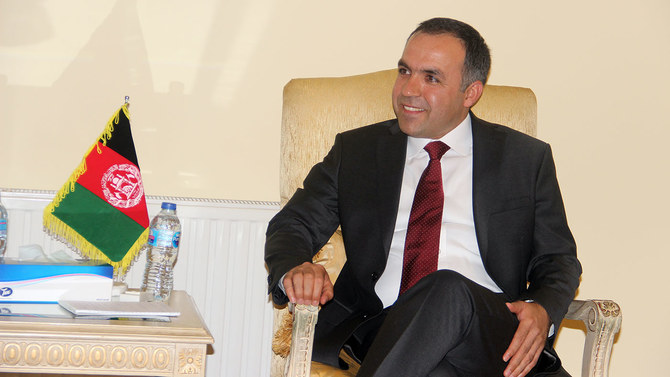
- Urges international community to emphasize Kabul lead the peace process
- More than 50 Afghan leaders arrived at the Pakistani hill station of Bhurban on Saturday for a peace meet
‘Politically motivated’: Pakistan rejects US State Department report on rights abuses
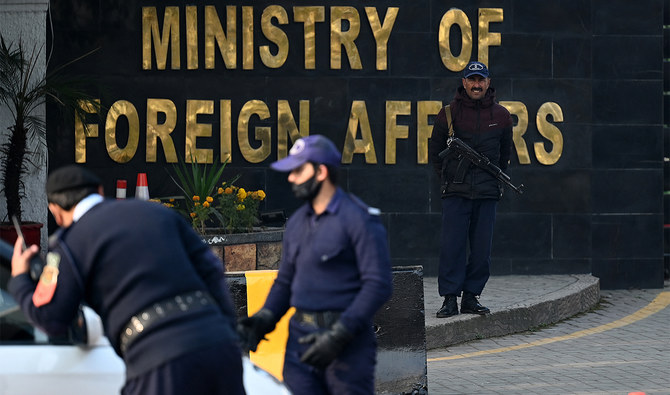
- Annual assessment identified arbitrary detentions, extrajudicial killings, enforced disappearances
- Pakistan government and state agencies deny involvement in missing persons cases, other rights abuses
ISLAMABAD: Pakistan said on Thursday it “categorically” rejected the 2023 country report on human rights practices issued by the US State Department, saying the report was politically motivated, lacking in objective evidence and followed an agenda of “politicization of international human rights.”
The annual human rights assessment released earlier this week identified arbitrary killings, extrajudicial killings, enforced disappearance, torture and “cases of cruel, inhuman, or degrading treatment or punishment by the government or its agents” in Pakistan last year.
The report also said the government “rarely took credible steps” to identify and punish officials who may have committed rights abuses.
“The contents of the report are unfair, based on inaccurate information and are completely divorced from the ground reality,” the Pakistani foreign office said in a statement, adding that the assessment used a “domestic social lens to judge human rights in other countries in a politically biased manner.”
“This year’s report is once again conspicuous by its lack of objectivity and politicization of the international human rights agenda. It clearly demonstrates double standards thus undermining the international human rights discourse.”
The foreign office said it was “deeply concerning” that a report purported to highlight human rights issues around the world was ignoring or downplaying the “most urgent hotspots of gross human rights violations” like Gaza and Kashmir. It also called on the US demonstrate the “requisite moral courage” to speak the truth about all situations and play a constructive role in supporting international efforts to end human rights violations.
“In line with its constitutional framework and democratic ethos, Pakistan remains steadfast in its commitment to strengthen its own human rights framework, constructively engage to promote international human rights agenda, and uphold fairness and objectivity in the international human rights discourse,” the FO added.
Political leaders, rights groups and families of victims have long accused the government, the army and intelligence agencies of being behind cases of arbitrary detentions, extrajudicial killings and enforced disappearances, among other rights abuses. Families say people picked up by security forces on the pretext of fighting militancy or crime often disappear for years, and are sometimes found dead, with no official explanation. Pakistani state agencies deny involvement in such cases.
On Tuesday, Pakistan’s law minister said the government would reconstitute a committee to address enforced disappearances, hours after the release of the US report.
“Now the work is being initiated on this again on the directives of the prime minister. A committee is going to be reconstituted, there will be parliamentary presence in that committee,” Law Minister Azam Nazeer Tarar said.
“There is no lack of seriousness on the government’s part to resolve this issue.”
Pakistani court bars ex-PM Khan, wife from issuing statements against state institutions
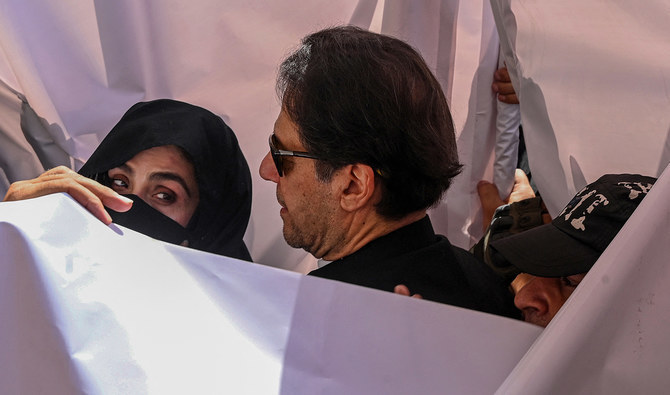
- Accountability court directs media personnel to confine reporting to proceedings of the trial only
- Khan widely believed to have fell out with army, leading to ouster from PM office in 2022
ISLAMABAD: A Pakistani accountability court judge recently barred former prime minister Imran Khan and his wife, Bushra Bibi, from issuing “derogatory” or “inflammatory” statements against state institutions and their officials.
Khan, who was PM from 2018-2022, remains jailed in multiple cases, including a 14-year jail sentence for him and his wife for the illegal sale of state gifts. Khan was first imprisoned after being handed a three-year prison sentence in August 2023 by the Election Commission for not declaring assets earned from selling gifts worth more than 140 million rupees ($501,000) in state possession and received during his premiership. In January, Khan and wife Bushra Bibi were handed 14-year jail terms following a separate investigation by the country’s top anti-graft body into the same charges involving state gifts.
Khan blames Pakistan’s powerful military, which has ruled the country directly for over 30 years, for colluding with his rivals to remove him from office via a parliamentary vote in April 2022 and subsequently cracking down on his supporters. The military denies his accusations and has repeatedly said it does not interfere in political matters.
On Friday, accountability court judge Nasir Javed Rana heard Khan’s petition requesting a fair trial. The PTI founder had sought the removal of glass and wooden structures erected at the Central Prison in Rawalpindi, where an appeal against his conviction is being heard. He had also alleged that reporters were not being allowed to attend proceedings, saying that the actions violated the principles of an open trial ordered by the court.
“The accused persons shall refrain from making any political, inflammatory and/or derogatory statements vis-a-vis state institutions and the officials insinuating anything to them,” a copy of the order, seen by Arab News that emerged on Thursday, read.
“The media personnel shall confine their reporting to the proceedings of the trial and shall not publish/report any statements in the trial proceedings, as witness or as counsel,” it added.
Khan’s convictions mean he is banned from holding public office and ruled the 71-year-old out of general elections earlier this year. Arguably Pakistan’s most popular politician, Khan says all cases against him are motivated to keep him out of politics.
Tensions between Khan and the military escalated in May 2023, when angry supporters of his party took to the streets in response to his brief detention, and torched government buildings and ransacked military installations in many parts of the country.
The army cracked down on Khan’s supporters and leaders following the attacks. Khan denied he had incited his supporters to protest violently, saying he was in detention when they erupted.
Pakistan eye comeback against New Zealand in fourth T20I today
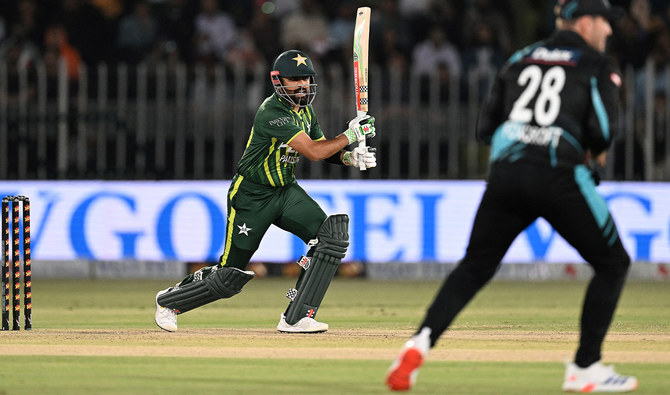
- A second-string New Zealand squad beat Pakistan by seven wickets on Sunday in Rawalpindi
- Skipper Babar Azam says pacers Shaheen Shah Afridi, Naseem Shah have ability to make comeback
ISLAMABAD: Pakistan will be eyeing a comeback today, Thursday, in the fourth match of the T20I series against New Zealand in Lahore after suffering a defeat at the hands of a second-string Kiwi squad last week.
Pakistan will head into today’s match against Michael Bracewell’s squad without star batter and wicketkeeper Muhammad Rizwan, who has been pulled from the series after he felt discomfort in his right hamstring.
New Zealand are missing key players including Trent Boult and skipper Kane Williamson as they opted to play in the lucrative Indian Premier League (IPL) while pulled out of the Pakistan series due to injuries.
Despite that, the Kiwis managed to beat Pakistan on Sunday by seven wickets in Rawalpindi, shocking the 2009 T20I world champions on their own turf.
“We did not lose because of any two or three players,” Pakistan captain Babar Azam said at a press conference in Lahore on Wednesday night. “We lost as a team. In the batting, bowling and fielding [areas] we did collapse a little.”
Pakistan’s premium fast bowlers Naseem Shah and Shaheen Shah Afridi failed to impress against New Zealand in the third T20I. However, Azam backed both bowlers, describing them as Pakistan’s “best” bowlers.
“They know how to make a comeback, even if it [bad performance] happens in one game. It is part of life,” he said. “It can’t happen that one person performs every single day.”
The series is an important one for both sides as they gear up for the ICC T20 World Cup 2024 in the West Indies and USA scheduled to be held in June.
The last match of the Pakistan-New Zealand series will be played in Lahore on May 27. Pakistan and New Zealand have both won one match against each other so far, with the first T20I fixture washed away by rain.
The match begins at 7:30 p.m. Pakistan Standard Time.
Pakistan suffered more from Afghan ‘imbroglio’ than wars with India — special envoy to Kabul
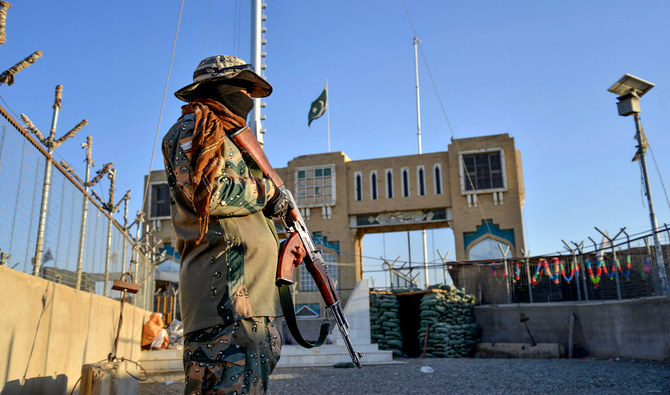
- Ambassador Durrani hopes Pakistan will overcome security threats from Afghanistan through diplomacy
- He warns of growing hostilities in the Middle East, saying the Iran-Israel conflict can engulf the region
ISLAMABAD: Pakistan’s Special Representative for Afghanistan Ambassador Asif Durrani acknowledged that his country had suffered a great deal more due to the volatility in its northwestern neighborhood than its recurrent wars in the east with nuclear-armed India while addressing a conference on Wednesday.
Durrani issued the statement during a penal discussion at the Institute of Strategic Studies Islamabad while sharing a broad overview of his country’s threat perception. Pakistan blamed the administration in Kabul last year in November for not doing enough to address its security concerns by clamping down on militants operating from Afghanistan.
It even maintained there was enough evidence that Afghan authorities were “facilitating” attacks launched by the Tehreek-e-Taliban Pakistan (TTP) against its people and security forces. Subsequently, Pakistan started deporting “illegal immigrants,” mostly Afghans, from its cities while citing security reasons.
“Afghanistan has become a permanent fixture in Pakistan’s regional paradigm for over four decades,” Durrani told the gathering. “In terms of blood and treasure, Pakistan has suffered more due to the Afghan imbroglio than its three wars with India.”
“Over 80,000 Pakistanis have died in the past two decades during the so-called war on terror,” he continued. “The country is still counting its dead and injured. After the withdrawal of the NATO forces, it was hoped that peace in Afghanistan would bring peace in the region. However, such expectations were short-lived.”
Durrani maintained that TTP attacked had increased by 65 percent after the departure of international forces while suicide bombings had shot up by 500 percent.
“The TTP’s enhanced attacks on Pakistan while using Afghan soil have been a serious concern for Pakistan,” he said. “Another worrying aspect is the participation of Afghan nationals in these attacks.”
He hoped that his country would overcome threats emerging from Afghanistan through diplomatic means, though he warned of the rising tensions in the Middle East while pointing out that the Iran-Israel conflict, if not contained, could engulf the whole region.
“Pakistan will also suffer,” he added.
Durrani said the estimated economic cost suffered by his country since the US-led “war on terror” was somewhere around $150 billion.
Pakistan doubles down on completing Iran gas pipeline despite threat of sanctions
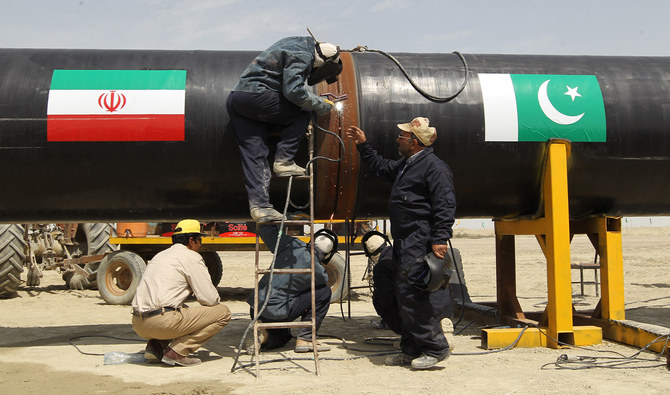
- Major gas pipeline deal has faced delays due to geopolitical issues and international sanctions
- On Wednesday, US warned that countries doing business with Iran faced the “potential risk of sanctions”
ISLAMABAD: Defense Minister Khawaja Asif said on Thursday Pakistan would find a way to complete a major gas pipeline deal with Iran which has faced delays for years due to geopolitical issues and international sanctions.
During a visit by Iranian President Ebrahim Raisi to Pakistan this week, the two nations reiterated the importance of cooperation in the energy domain, including trade in electricity, power transmission lines and the IP Gas Pipeline Project, a joint statement released following the culmination of the visit said.
“We will find a way to complete it,” Asif told reporters when asked if Pakistani officials had discussed the stalled pipeline with Raisi.
In March, Islamabad said it would seek a US sanctions waiver for the pipeline. However, later that week, the US said publicly it did not support the project and cautioned about the risk of sanctions in doing business with Tehran.
On Wednesday, the United States once again warned that countries doing business with Iran faced the “potential risk of sanctions.”
“Just let me say broadly, we advise anyone considering business deals with Iran to be aware of the potential risk of sanctions,” a State Department spokesperson said when asked about the Iranian president’s Pakistan visit and agreements signed. “But ultimately, the government of Pakistan can speak to their own foreign policy pursuits.”
The pipeline deal, signed in 2010, envisaged the supply of 750 million to a billion cubic feet per day of natural gas for 25 years from Iran’s South Pars gas field to Pakistan to meet Pakistan’s rising energy needs. The pipeline was to stretch over 1,900 kilometers (1,180 miles) — 1,150 km within Iran and 781 km within Pakistan.
Tehran says it has already invested $2 billion to construct the pipeline on its side of the border, making it ready to export. Pakistan, however, did not begin construction and shortly after the deal said the project was off the table for the time being, citing international sanctions on Iran as the reason.
Iran’s oil minister at the time responded by saying that Iran carried out its commitments and expects Pakistan to honor its own, adding that Pakistan needs to pick up the pace of work.
In 2014, Pakistan asked for a 10-year extension to build the pipeline, which expires in September this year. Iran can take Pakistan to international court and fine the country. Local media reported that Pakistan can be fined up to $18 billion for not holding up its half of the agreement.
Faced with a potential fine, Pakistan’s caretaker administration earlier this year gave the go ahead in principle to commence plans to build an 80 km segment of the pipeline. In March, Pakistan announced it would seek a sanctions’ waiver.
Washington’s support is crucial for Pakistan as the country looks to sign a new longer term bailout program with the International Monetary Fund (IMF) in coming weeks.
Pakistan, whose domestic and industrial users rely on natural gas for heating and energy needs, is in dire need for cheap gas with its own reserves dwindling fast and LNG deals making supplies expensive amidst already high inflation.
Iran has the world’s second-largest gas reserves after Russia, according to BP’s Statistical Review of World Energy, but sanctions by the West, political turmoil and construction delays have slowed its development as an exporter.
Originally, the deal also involved extending the pipeline to India, but Delhi later dropped out of the project.
With inputs from Reuters










